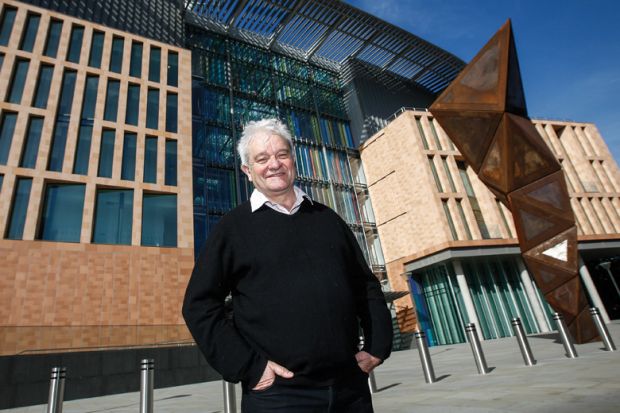The leader of Europe’s largest biomedical research institute has warned that restrictions on researcher mobility post-Brexit would have a disastrous impact on science and has questioned whether a new UK visa scheme will resolve his concerns.
Sir Paul Nurse, director of the Francis Crick Institute, told Times Higher Education that, while it was impossible to predict exactly what would happen once the UK leaves the European Union, he was “very worried” about aspects of Brexit.
“It’s no surprise that the majority of our staff are against Brexit, they see nothing but negativity in it,” he said. “There will be some who have the opposite view of course, but they are in the minority.”
A breakdown of the nationalities employed at the Crick shows that less than half are UK nationals (48 per cent). More than a third (36 per cent) come from other EU countries and about 16 per cent from the rest of the world.
Sir Paul said that the new hub, like all major research centres, would continue to rely on its ability to attract and recruit the best talent from abroad after Brexit. One of the founding principles of the £650 million centre is to thrive as an international base for “open scientific discovery”, the geneticist said.
However, “if Brexit were to switch off this ability, it could be a problem for us”, he said, adding that he was “worried about the visa situation” in particular.
EU researchers may have to apply for visas to work in the UK after Brexit. This summer, the UK Home Office announced a new scheme under which selected research institutes including the Crick could directly sponsor international academics for visas, in theory making it easier for them to take up roles in the UK.
But while Sir Paul said that his own institute was yet to see a drop-off in applicants – about 50 per cent of candidates for each role are from elsewhere in the EU – he warned that the processes involved in visa sponsorship remained “extremely laborious, complicated and bureaucratic, not to mention expensive”.
“When we have to shift everybody who comes here from Europe to the visa system that operates for the rest of the world, that’s going to be a heavy financial administrative blow to us,” he said. “It’s not good.”
Sir Paul said he would be “surprised” if visas were not granted to the families of EU staff, “because it would be close to madness to have a system which didn’t allow for that”.
“But there is a fear,” he continued. “If we have a ‘no deal’ Brexit, the whole country would be in turmoil, so I can’t predict what would happen after that.”
Last week the UK government warned that European Research Council grants promised to British-based researchers could be jeopardised in the event of a “no-deal” Brexit.
While funding guarantees issued by the Westminster government mean UK academics should be able to take part in most European Union programmes as “third country” participants, ERC grants – and some Marie Skłodowska-Curie actions, which support academic exchanges – do not permit third country participation.
Sir Paul, who shared the 2001 Nobel Prize in Physiology or Medicine, is one of seven chief scientific advisers to the European Commission. While he said he had no “inside information” on the commission’s position on scientific links post-Brexit, “what I can say is [European bodies] would like the UK to remain in the science arena, but actually they’d just like the UK to remain in Europe altogether”.
“The real problem we have is whether the political decision-making in the UK will rupture those connections [and] damage relations...and that is quite difficult,” he warned.
Register to continue
Why register?
- Registration is free and only takes a moment
- Once registered, you can read 3 articles a month
- Sign up for our newsletter
Subscribe
Or subscribe for unlimited access to:
- Unlimited access to news, views, insights & reviews
- Digital editions
- Digital access to THE’s university and college rankings analysis
Already registered or a current subscriber?








